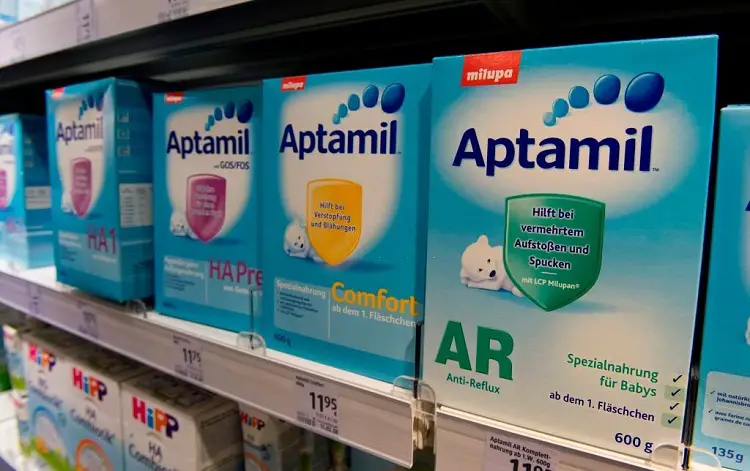Aptamil and Nutrilon are infant formula brands designed to provide essential nutrients for babies not breastfed or needing supplemental feeding.
Different companies produce them and may have slight differences in ingredients, formulations, and marketing.
It’s also important to consider both infant formula’s pros and cons before deciding.
This article will look at Aptamil vs Nutrilon to give you an in-depth knowledge of both formulas and enable you to choose.
Aptamil Vs Nutrilon
Aptamil
Aptamil is an infant formula brand produced by Danone, a multinational food-products corporation.
Aptamil offers a range of infant formulas to cater to different stages of a baby’s development, from newborns to older infants.
Their formulas may include prebiotics, nucleotides, and essential fatty acids to support the baby’s growth and development.
Aptamil’s formulations are designed to resemble the composition of breast milk as closely as possible.
Features
DHA Formula
Aptamil is a baby formula that contains DHA, a crucial nutrient that plays a vital role in supporting a baby’s normal brain development.
This nutrient is essential for cognitive growth and enhances infant brain performance.
Aptamil is a trusted brand that provides parents with peace of mind, knowing that their baby is receiving the necessary nutrients for optimal growth and development.
With Aptamil, you can be confident that your baby is on the right track towards a healthy future.
Presence of Probiotics
It has been found that Aptamil, a popular infant formula, contains probiotics. These are microorganisms that are believed to provide health benefits to the baby.
Probiotics can help to improve digestion, boost the immune system, and reduce the risk of various health conditions.
Aptamil’s inclusion of probiotics in its formula demonstrates its commitment to providing the best possible nutrition for infants.
Unique Taste
Aptamil formula is known for its distinct and exceptional taste that can pique the interest of your little one’s taste buds.
This formula is specially crafted to cater to your baby’s nutritional needs and ensure healthy growth and development.
Its unique taste results from the high-quality ingredients used in its formulation, making it a safe and reliable choice for your baby’s feeding needs.
DHA/ARA
Aptamil infant formula is enriched with DHA and ARA. These essential fatty acids are crucial for developing a baby’s brain and eyes and can be found naturally in breast milk.
Aptamil formula ensures that babies not breastfed can still receive these important nutrients for their growth and development.
Pros
- It promotes the growth of healthy bacteria
- It is nutritionally complete
- It can serve as a milk substitute
- Contains probiotics
- It is easy to digest
- It is Gluten
- Non-GMO
- Some of their products support the dietary requirements of babies diagnosed with colic, reflux, and cow’s milk allergy conditions.
Cons
- It is expensive
- Can make your baby gassy
- There are chances of clumping
Nutrilon
Nutrilon is a brand of infant formula produced by Nutricia, a subsidiary of the multinational company Danone (Nutricia is the specialized nutrition division of Danone).
Like Aptamil, Nutrilon offers a range of infant formulas for various stages of a baby’s growth.
Nutrilon formulas are formulated to provide the necessary nutrients for healthy development.
Nutrilon formulas might contain prebiotics, probiotics, and essential fatty acids.
Features of Nutrilon
Age-Specific Formulas
Nutrilon provides a comprehensive selection of formulas specially developed for infants at different stages of growth, including newborns, infants, and older babies.
Every formula is meticulously formulated to cater to the unique nutritional requirements of babies during that specific stage.
This ensures that infants receive the necessary nourishment to support their growth and development as they progress through each stage.
Hypoallergenic Options
Nutrilon, a trusted brand for baby nutrition, has introduced hypoallergenic formulas specifically formulated for infants at risk of developing allergies or who already suffer from known allergies.
These specially designed formulas are created with utmost care and precision to provide nutrients for your baby’s growth and development without causing any adverse reactions.
With Nutrilon, you can rest assured that your baby’s nutritional needs are being met safely and effectively.
Specialized Formulations
Nutrilon offers a range of specialized formulations designed to meet the unique health needs of babies.
These formulations are tailored to address specific conditions, such as premature birth or medical issues.
By providing targeted nutrition, Nutrilon helps support optimal growth and development in all babies, regardless of their individual health needs.
Probiotics and Prebiotics
It is worth noting that certain Nutrilon formulas have been designed to incorporate both probiotics, which are beneficial bacteria, and prebiotics, which are non-digestible fibers, to help promote the development of a healthy gut microbiome and improve digestion in infants.
This is important when selecting the appropriate formula for your child’s nutritional needs.
Essential Nutrients
Nutrilon formulas typically aim to balance essential nutrients, including proteins, carbohydrates, fats, vitamins, and minerals, to support overall growth and development.
Iron Fortification
Iron deficiency anemia is a prevalent concern during infancy, and many infant formulas address this issue by fortifying their products with iron.
Nutrilon, among other formulas, is one such product that provides this essential nutrient to help prevent iron deficiency anemia and promote healthy growth and development in infants.
Omega-3 and Omega-6 Fatty Acids
It is worth noting that certain Nutrilon formulas are enriched with essential omega-3 and omega-6 fatty acids, specifically DHA (docosahexaenoic acid) and ARA (arachidonic acid).
These fatty acids promote a healthy infant brain and visual development.
So, it is important to ensure that your baby’s nutritional needs are met by incorporating such formulas into their diet.
Easy Digestion
Nutrilon infant formulas are carefully formulated to nourish a developing digestive system.
The unique formulation of these formulas helps minimize digestive discomfort that can sometimes arise in infants.
With Nutrilon, parents can rest assured that their little one receives the best nutrition to support their growth and development.
Pros
- It promotes the growth of healthy bacteria
- It is nutritionally complete.
- It has different varieties.
- It is easy to digest
- Nutrilon formulas may contain omega-3 and omega-6 fatty acids, such as DHA (docosahexaenoic acid) and ARA (arachidonic acid), which are important for brain and visual development.
- Nutrilon formulas may contain probiotics (beneficial bacteria) and prebiotics (non-digestible fibers) to support a healthy gut microbiome and digestion in infants.
Cons
- It can be costly at times.
- While Nutrilon offers hypoallergenic options, some babies may still experience sensitivity or allergies to certain ingredients in the formula.
- Regulations and standards for infant formula can vary from one country to another.
- Just like with any formula, some babies may not accept the taste or texture of Nutrilon, which can potentially lead to feeding difficulties or preferences.
When choosing between Aptamil and Nutrilon, it’s important to consider your baby’s specific needs, any recommendations from your pediatrician, and personal preferences.
Both brands aim to provide adequate infant nutrition, and the choice may come down to availability, price, and individual preferences.
It’s crucial to follow the instructions on the formula packaging and consult with a healthcare professional, such as a pediatrician or a registered dietitian, before making any decisions about infant feeding.
They can provide guidance tailored to your baby’s unique needs and circumstances.
Aptamil Vs Nutrilon – Similarities & Differences

Similarities
- They are nutritionally complete
- They all closely resemble breast milk
- Both of DHA
- Both contain vitamins and minerals.
- Both formulas are fortified with Iron
- They have a wide range of formulas
Differences
Manufacturer
Aptamil is produced by Danone, a multinational food-products corporation based in France, while Nutrilon is produced by Nutricia, a Danone subsidiary based in the Netherlands.
Ingredients
The composition of Aptamil and Nutrilon formulas may differ depending on the specific type and stage of the product.
Nevertheless, the primary objective of these brands is to furnish a well-rounded combination of critical nutrients, such as proteins, carbohydrates, fats, vitamins, and minerals, to meet the nutritional requirements of infants.
Regional Differences
It’s important to note that Aptamil and Nutrilon might have slightly different formulations based on the country or region in which they are sold.
Regulations and guidelines for infant formula can vary from country to country, leading to differences in ingredients and nutritional content.
Related Posts:
Choosing Between Aptamil vs Nutrilon
The choice between Aptamil and Nutrilon depends on your baby’s nutritional needs, availability, and personal preferences.
Both brands offer a range of infant formulas and baby foods, but it can be difficult to know which one to choose.
Ultimately, the best choice will depend on your needs and preferences and your baby’s.
It may be helpful to consult a healthcare professional or research to determine which brand fits you and your little one.
Conclusion
We have to end our comparison between Aptamil vs Nutrilon, and I believe it was hitch-free, and you are better informed now.
Aptamil and Nutrilon are reputable infant formula brands that offer a range of products to meet the nutritional needs of babies.
When choosing between the two, consider factors like your baby’s specific needs, regional differences, and any recommendations from healthcare professionals.
Before making a decision, it’s recommended to consult with a healthcare professional, such as a pediatrician or a registered dietitian. They can provide guidance based on your baby’s needs and potential concerns.
